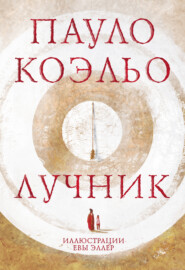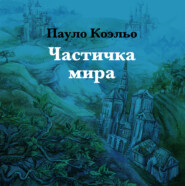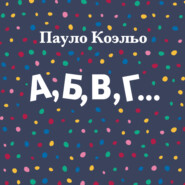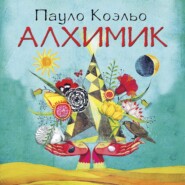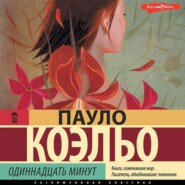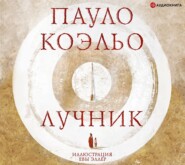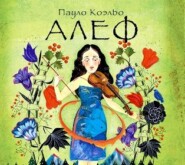По всем вопросам обращайтесь на: info@litportal.ru
(©) 2003-2025.
✖
The Witch of Portobello
Автор
Год написания книги
2018
Настройки чтения
Размер шрифта
Высота строк
Поля
I’m getting old now, and God could take me at any moment. I’ve remained faithful to my religion and I believe that, for all its errors, it really is trying to put things right. This will take decades, possibly centuries, but one day, all that will matter is love and Christ’s words: ‘Come unto me all ye that labour and are heavy laden, and I will give you rest.’ I’ve devoted my entire life to the priesthood and I don’t regret my decision for one second. However, there are times, like that Sunday, when, although I didn’t doubt my faith, I did doubt men.
I know now what happened to Athena, and I wonder: Did it all start there, or was it already in her soul? I think of the many Athenas and Lukáses in the world who are divorced and because of that can no longer receive the sacrament of the Eucharist; all they can do is contemplate the suffering, crucified Christ and listen to His words, words that are not always in accord with the laws of the Vatican. In a few cases, these people leave the church, but the majority continue coming to mass on Sundays, because that’s what they’re used to, even though they know that the miracle of the transmutation of the bread and the wine into the flesh and the blood of the Lord is forbidden to them.
I like to imagine that, when she left the church, Athena met Jesus. Weeping and confused, she would have thrown herself into his arms, asking him to explain why she was being excluded just because of a piece of paper she’d signed, something of no importance on the spiritual plane, and which was of interest only to registry offices and the tax man.
And looking at Athena, Jesus might have replied:
‘My child, I’ve been excluded too. It’s a very long time since they’ve allowed me in there.’
Pavel Podbielski, 57, owner of the apartment (#ulink_a1884472-47d8-5745-8583-6ebe02e0c7c7)
A thena and I had one thing in common: we were both refugees from a war and arrived in England when we were still children, although I fled Poland over fifty years ago. We both knew that, despite that physical change, our traditions continue to exist in exile – communities join together again, language and religion remain alive, and in a place that will always be foreign to them, people tend to look after each other.
Traditions continue, but the desire to go back gradually disappears. That desire needs to stay alive in our hearts as a hope with which we like to delude ourselves, but it will never be put into practice; I’ll never go back to live in Częstochowa, and Athena and her family will never return to Beirut.
It was this kind of solidarity that made me rent her the third floor of my house in Basset Road – normally, I’d prefer tenants without children. I’d made that mistake before, and two things had happened: I complained about the noise they made during the day, and they complained about the noise I made during the night. Both noises had their roots in sacred elements – crying and music – but they belonged to two completely different worlds and it was hard for them to coexist.
I warned her, but she didn’t really take it in, and told me not to worry about her son. He spent all day at his grandmother’s house anyway, and the apartment was conveniently close to her work at a local bank.
Despite my warnings, and despite holding out bravely at first, eight days later the doorbell rang. It was Athena, with her child in her arms.
‘My son can’t sleep. Couldn’t you turn the music down at least for one night?’
Everyone in the room stared at her.
‘What’s going on?’
The child immediately stopped crying, as if he were as surprised as his mother to see that group of people, who had stopped in mid-dance.
I pressed the pause button on the cassette player and beckoned her in. Then I restarted the music so as not to interrupt the ritual. Athena sat down in one corner of the room, rocking her child in her arms and watching him drift off to sleep despite the noise of drums and brass. She stayed for the whole ceremony and left along with the other guests, but – as I thought she would – she rang my doorbell the next morning, before going to work.
‘You don’t have to explain what I saw – people dancing with their eyes closed – because I know what that means. I often do the same myself, and at the moment those are the only times of peace and serenity in my life. Before I became a mother, I used to go to clubs with my husband and my friends, and I’d see people dancing with their eyes closed there too. Some were just trying to look cool, and others seemed to be genuinely moved by a greater, more powerful force. And ever since I’ve been old enough to think for myself, I’ve always used dance as a way of getting in touch with something stronger and more powerful than myself. Anyway, could you tell me what that music was?’
‘What are you doing this Sunday?’
‘Nothing special. I might go for a walk with Viorel in Regent’s Park and get some fresh air. I’ll have plenty of time later on for a social calendar of my own; for the moment, I’ve decided to follow my son’s.’
‘I’ll come with you, if you like.’
On the two nights before our walk, Athena came to watch the ritual. Her son fell asleep after only a few minutes, and she merely watched what was going on around her without saying a word. She sat quite still on the sofa, but I was sure that her soul was dancing.
On Sunday afternoon, while we were walking in the park, I asked her to pay attention to everything she was seeing and hearing: the leaves moving in the breeze, the waves on the lake, the birds singing, the dogs barking, the shouts of children as they ran back and forth, as if obeying some strange logic, incomprehensible to grown-ups.
‘Everything moves, and everything moves to a rhythm. And everything that moves to a rhythm creates a sound. At this moment, the same thing is happening here and everywhere else in the world. Our ancestors noticed the same thing when they tried to escape from the cold into caves: things moved and made noise. The first human beings may have been frightened by this at first, but that fear was soon replaced by a sense of awe: they understood that this was the way in which some Superior Being was communicating with them. In the hope of reciprocating that communication, they started imitating the sounds and movements around them – and thus dance and music were born. A few days ago, you told me that dance puts you in touch with something stronger than yourself.’
‘Yes, when I dance, I’m a free woman, or, rather, a free spirit who can travel through the universe, contemplate the present, divine the future, and be transformed into pure energy. And that gives me enormous pleasure, a joy that always goes far beyond everything I’ve experienced or will experience in my lifetime. There was a time when I was determined to become a saint, praising God through music and movement, but that path is closed to me forever now.’
‘Which path do you mean?’
She made her son more comfortable in his pushchair. I saw that she didn’t want to answer that question and so I asked again: when mouths close, it’s because there’s something important to be said.
Without a flicker of emotion, as if she’d always had to endure in silence the things life imposed on her, she told me about what had happened at the church, when the priest – possibly her only friend – had refused her communion. She also told me about the curse she had uttered then, and that she had left the Catholic Church forever.
‘A saint is someone who lives his or her life with dignity,’ I explained. ‘All we have to do is understand that we’re all here for a reason and to commit ourselves to that. Then we can laugh at our sufferings, large and small, and walk fearlessly, aware that each step has meaning. We can let ourselves be guided by the light emanating from the Vertex.’
‘What do you mean by the Vertex? In mathematics, it’s the topmost angle of a triangle.’
‘In life, too, it’s the culminating point, the goal of all those who, like everyone else, make mistakes, but who, even in their darkest moments, never lose sight of the light emanating from their hearts. That’s what we’re trying to do in our group. The Vertex is hidden inside us, and we can reach it if we accept it and recognise its light.’
I explained that I’d come up with the name ‘the search for the Vertex’ for the dance she’d watched on previous nights, performed by people of all ages (at the time there were ten of us, aged between nineteen and sixty-five). Athena asked where I’d found out about it.
I told her that, immediately after the end of the Second World War, some of my family had managed to escape from the Communist regime that was taking over Poland, and decided to move to England. They’d been advised to bring with them art objects and antiquarian books, which, they were told, were highly valued in this part of the world.
Paintings and sculptures were quickly sold, but the books remained, gathering dust. My mother was keen for me to read and speak Polish, and the books formed part of my education. One day, inside a nineteenth-century edition of Thomas Malthus, I found two pages of notes written by my grandfather, who had died in a concentration camp. I started reading, assuming it would be something to do with an inheritance or else a passionate letter intended for a secret lover, because it was said that he’d fallen in love with someone in Russia.
There was, in fact, some truth in this. The pages contained a description of his journey to Siberia during the Communist revolution. There, in the remote village of Diedov, he fell in love with an actress. (Editor’s note: It has not been possible to locate this village on the map. The name may have been deliberately changed, or the place itself may have disappeared after Stalin’s forced migrations.) According to my grandfather, the actress was part of a sect who believed that they had found the remedy for all ills through a particular kind of dance, because the dance brought the dancer into contact with the light from the Vertex.
They feared that the tradition would disappear; the inhabitants of the village were soon to be transported to another place. Both the actress and her friends begged him to write down what they had learned. He did, but clearly didn’t think it was of much importance, because he left his notes inside a book, and there they remained until the day I found them.
Athena broke in:
‘But dance isn’t something you write about, you have to do it.’
‘Exactly. All the notes say is this: Dance to the point of exhaustion, as if you were a mountaineer climbing a hill, a sacred mountain. Dance until you are so out of breath that your organism is forced to obtain oxygen some other way, and it is that, in the end, which will cause you to lose your identity and your relationship with space and time. Dance only to the sound of percussion; repeat the process every day; know that, at a certain moment, your eyes will, quite naturally, close, and you will begin to see a light that comes from within, a light that answers your questions and develops your hidden powers.’
‘Have you developed some special power?’
Instead of replying, I suggested that she join our group, since her son seemed perfectly at ease even when the noise of the cymbals and the other percussion instruments was at its loudest. The following day, at the usual time, she was there for the start of the session. I introduced her to my friends, explaining that she was my upstairs neighbour. No one said anything about their lives or asked her what she did. When the moment came, I turned on the music and we began to dance.
She started dancing with the child in her arms, but he soon fell asleep, and she put him down on the sofa. Before I closed my eyes and went into a trance, I saw that she had understood exactly what I meant by the path of the Vertex.
Every day, except Sunday, she was there with the child. We would exchange a few words of welcome, then I would put on the music a friend of mine had brought from the Russian steppes, and we would all dance to the point of exhaustion. After a month of this, she asked me for a copy of the tape.
‘I’d like to do the dancing in the morning, before I leave Viorel at my Mum’s house and go to work.’
I tried to dissuade her.
‘I don’t know, I think a group that’s connected by the same energy creates a kind of aura that helps everyone get into the trance state. Besides, doing the dancing before you go to work is just asking to get the sack, because you’ll be exhausted all day.’
Athena thought for a moment, then said:
‘You’re absolutely right when you talk about collective energy. In your group, for example, there are four couples and your wife. All of them have found love. That’s why they can share such a positive vibration with me. But I’m on my own, or, rather, I’m with my son, but he can’t yet manifest his love in a way we can understand. So I’d prefer to accept my loneliness. If I try to run away from it now, I’ll never find a partner again. If I accept it, rather than fight against it, things might change. I’ve noticed that loneliness gets stronger when we try to face it down, but gets weaker when we simply ignore it.’
‘Did you join our group in search of love?’
‘That would be a perfectly good reason, I think, but the answer is “No”. I came in search of a meaning for my life, because, at present, its only meaning is my son, Viorel, and I’m afraid I might end up destroying him, either by being over-protective or by projecting onto him the dreams I’ve never managed to realise. Then one night, while I was dancing, I felt that I’d been cured. If we were talking about some physical ailment, we’d probably call it a miracle, but it was a spiritual malaise that was making me unhappy, and suddenly it vanished.’
I knew what she meant.






